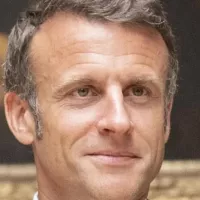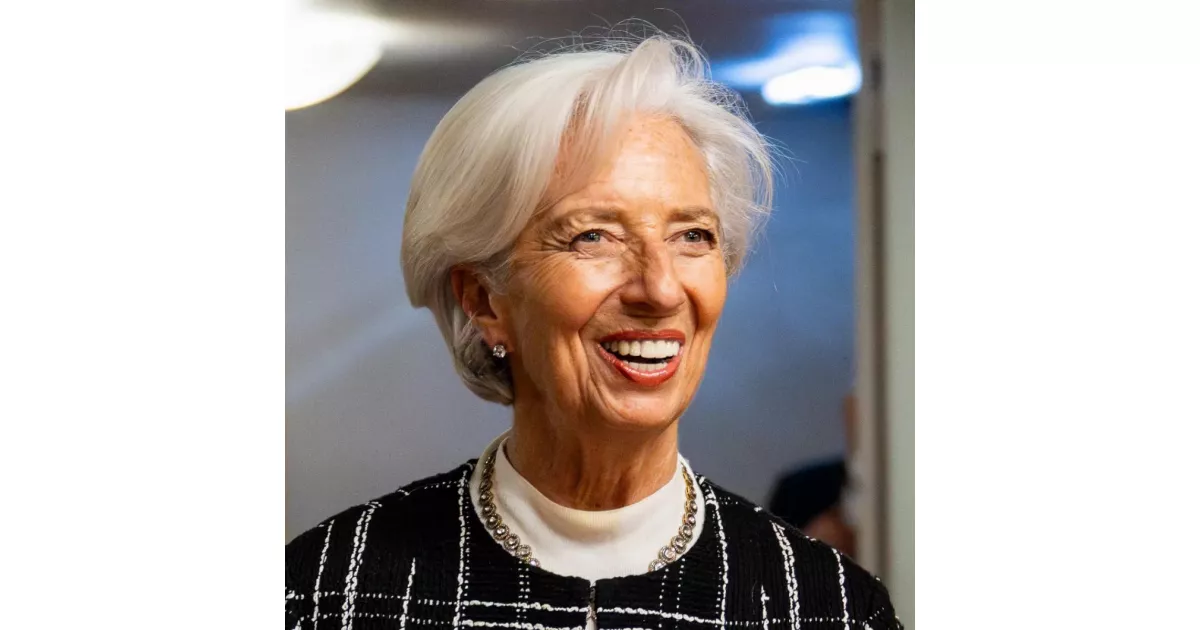Christine Lagarde is a prominent French politician and lawyer. She holds the distinction of being the first woman to lead the European Central Bank (ECB), a position she has held since 2019. Prior to the ECB, Lagarde served as the Managing Director of the International Monetary Fund (IMF) from 2011 to 2019. Her career also includes significant roles in the French government, most notably as the Minister of the Economy, Finance and Industry from 2007 to 2011. Her leadership across international and national institutions marks her as a significant figure in global economics and politics.
January 1956: Christine Lagarde born
On January 1956, Christine Madeleine Odette Lagarde, née Lallouette, was born.
1973: American Field Service scholarship
In 1973, after her baccalauréat, Christine Lagarde went on an American Field Service scholarship to the Holton-Arms School in Bethesda, Maryland.
1981: Joined Baker & McKenzie
In 1981, Christine Lagarde joined Baker & McKenzie, a large Chicago-based international law firm.
1982: Marriage to Wilfried Lagarde
In 1982, Christine Lagarde married her first partner, French financial analyst Wilfried Lagarde.
1986: Birth of Son Pierre-Henri Lagarde
In 1986, Christine Lagarde's first son, Pierre-Henri Lagarde, was born.
1988: Birth of Son Thomas Lagarde
In 1988, Christine Lagarde's second son, Thomas Lagarde, was born.
1992: Divorce from Wilfried Lagarde
In 1992, Christine Lagarde divorced her first husband, Wilfried Lagarde.
1995: Member of the executive committee
In 1995, Christine Lagarde became a member of the executive committee of Baker & McKenzie.
October 1999: First female chairman
In October 1999, Christine Lagarde was elected the company's first female chairman at Baker & McKenzie.
1999: Chair of Baker & McKenzie
In 1999, Christine Lagarde was elevated to Chair of Baker & McKenzie, becoming the first woman in that position.
2004: President of the Global Strategic Committee
In 2004, Christine Lagarde became president of the Global Strategic Committee.
2004: End of tenure as chair
In 2004, Christine Lagarde's tenure as chair of Baker & McKenzie ended when she decided to go into public service.
2005: France's trade minister
Between 2005 and May 2007, Lagarde served as France's trade minister, prioritizing opening new markets for the country's products, focusing on the technology sector.
2005: Minister of Foreign Trade
In 2005, Christine Lagarde was appointed Minister of Foreign Trade in France.
2006: Inspiration for Miranda Priestly's Appearance
In 2006, Meryl Streep based aspects of Miranda Priestly's appearance in The Devil Wears Prada on Christine Lagarde, citing her "unassailable elegance and authority".
2006: Relationship with Xavier Giocanti
Since 2006, Christine Lagarde has been in a relationship with French entrepreneur Xavier Giocanti, a fellow student from Université Paris X. Their relationship is sometimes described as a marriage.
May 2007: Ministry of Agriculture
On 18 May 2007, Christine Lagarde was moved to the Ministry of Agriculture as part of the government of François Fillon.
June 2007: Minister of Agriculture and Fisheries
In June 2007, Christine Lagarde briefly served as Minister of Agriculture and Fisheries.
2007: Arbitration Deal in Favor of Bernard Tapie
In 2007, during Christine Lagarde's tenure as finance minister, a €403 million arbitration deal was made in favor of businessman Bernard Tapie, leading to subsequent investigations.
2008: Government response to financial crisis
During her tenure, Christine Lagarde oversaw the government response to the 2007–2008 financial crisis.
July 2010: IMF lending program for European countries
In July 2010, Christine Lagarde discussed the IMF's lending program for distressed European countries on PBS NewsHour.
2010: Condemnation of racist remarks
In 2010, Christine Lagarde condemned Jean-Paul Guerlain's racist remarks.
2010: Interview in Documentary Film "Inside Job"
In 2010, Christine Lagarde was interviewed in the documentary film Inside Job, which later received an Academy Award for Best Documentary Feature.
2010: Presided over Aix school's board of directors
Since 2010, Christine Lagarde has presided over the Aix school's board of directors.
May 2011: Candidacy for head of the IMF
On 25 May 2011, Christine Lagarde announced her candidacy to be head of the IMF to succeed Dominique Strauss-Kahn, upon his resignation.
June 2011: Elected as managing director of the IMF
On 28 June 2011, the IMF board elected Christine Lagarde as its next managing director and chairman for a five-year term, starting on 5 July 2011.
July 2011: Appointment as IMF managing director
In July 2011, Christine Lagarde's five-year term as managing director and chairman of the IMF began.
July 2011: Elected Managing Director of the IMF
On 5 July 2011, Christine Lagarde was elected to replace Dominique Strauss-Kahn as managing director of the IMF for a five-year term.
August 2011: Investigation Ordered into Lagarde's Role in Arbitration Deal
In August 2011, La Cour de Justice de la République ordered an investigation into Christine Lagarde's role in a €403 million arbitration deal favoring businessman Bernard Tapie during her tenure as finance minister in 2007.
September 2011: Profiled in Vogue Magazine
In September 2011, Christine Lagarde was profiled in the American fashion magazine Vogue.
December 2011: Risk to the world economy
On 25 December 2011, Christine Lagarde argued that the world economy was at risk and urged Europeans to unify in terms of the debt crisis facing the continent.
2011: Minister of Finance
From 2007 to 2011, Christine Lagarde served as Minister of Finance, making her the first female to hold the finance portfolio of any Group of Eight economy.
2011: Managing Director of the IMF
In 2011, Christine Lagarde became the 11th Managing Director of the International Monetary Fund (IMF).
2011: Portrayal in "Too Big to Fail"
In 2011, Christine Lagarde was portrayed by Laila Robins in the HBO television film Too Big to Fail, based on Andrew Ross Sorkin's book.

May 2012: Controversy over Greek debt crisis comments
In May 2012, Christine Lagarde's comments about Greek tax avoidance and "payback time" regarding the Greek government-debt crisis provoked controversy.
July 2012: Not in the negotiation mood
In July 2012, Christine Lagarde said she was "not in the negotiation or renegotiation mood at all" regarding the terms of external assistance to Greece, as the Greek economy continued to decline.
October 2012: Publication of the Greek Customers List and Arrest of Kostas Vaxevanis
On 28 October 2012, Greek reporter Kostas Vaxevanis claimed possession of the list of Greek customers with HSBC accounts, publishing over 2,000 names in his magazine Hot Doc. He was promptly arrested for breaching privacy laws but was found not guilty three days later after a public outcry. He faced a retrial and was acquitted again.
March 2013: Lagarde's Apartment in Paris Raided
In March 2013, as part of the investigation into the Tapie arbitration deal, French police raided Christine Lagarde's apartment in Paris.
May 2013: Lagarde Assigned "Assisted Witness" Status
In May 2013, after two days of questioning, Christine Lagarde was assigned the status of "assisted witness" by the Court of Justice of the Republic (CJR), indicating she was not under formal investigation at that time regarding the Tapie case.
June 2013: CEO of France Telecom's Testimony
According to a press report from June 2013, Stéphane Richard, CEO of France Telecom, testified that Christine Lagarde was fully briefed before she approved the arbitration process that benefitted Bernard Tapie. Richard himself was under formal investigation in the case.
2013: Letter Expressing Allegiance to Nicolas Sarkozy Revealed
In 2013, a hand-written letter from Christine Lagarde to then-President Nicolas Sarkozy was revealed, expressing her full allegiance and willingness to be used as he saw fit, seeking his guidance and support.
August 2014: Formal Negligence Investigation Approved
In August 2014, the CJR formally approved a negligence investigation into Christine Lagarde's role in the arbitration of the Tapie case.
2014: Richard Dimbleby Lecture
In 2014, Christine Lagarde delivered the Richard Dimbleby Lecture, titled "A New Multilateralism for the 21st Century".
January 2015: Shredding of Corruption Case Documents
In January 2015, just before the Greek general elections where Syriza was expected to win, the financial crimes police of the conservative government of Antonis Samaras allegedly shredded numerous documents related to corruption cases.
January 2015: Comments on King Abdullah's death
In January 2015, on the death of King Abdullah of Saudi Arabia, Christine Lagarde said "he was a strong believer in pushing forward women's rights", prompting commentary on the life of women in Saudi Arabia.
December 2015: Possible continuation as head of the IMF
On 17 December 2015, Michel Sapin, French Finance Minister, said that Christine Lagarde could stay on as head of the IMF, despite being charged with criminal negligence.
December 2015: Lagarde Ordered to Stand Trial
On 17 December 2015, the CJR ordered Christine Lagarde to stand trial for alleged negligence in handling the Tapie arbitration approval.
2015: Calling for massive debt relief
In 2015, Christine Lagarde's organization made headlines by calling for massive debt relief for Greece, a call she reiterated personally.
July 2016: Second term as Managing Director of the IMF
Starting 5 July 2016, Christine Lagarde was selected by consensus for a second five-year term as Managing Director of the IMF, being the only candidate nominated for the post.
December 2016: Convicted of negligence
In December 2016, a French court convicted Christine Lagarde of negligence relating to her role in the Bernard Tapie arbitration, but did not impose a penalty.
December 2016: Lagarde Found Guilty of Negligence
In December 2016, the court found Christine Lagarde guilty of negligence but did not impose a fine or custodial penalty.
2016: Refusal to participate in emergency financing
In 2016, the IMF refused to participate with eurozone countries in further emergency financing for Greece, because concrete measures to relieve the country of its debt burden remained absent.
July 2019: Prince Michael of Liechtenstein worried
In July 2019 Prince Michael of Liechtenstein worried that Lagarde had "been extremely supportive of heavy deficit spending and cheap money" and felt that this fact portended ill.
July 2019: Nomination as President of the ECB
On 2 July 2019, Christine Lagarde was nominated by the European Council to succeed Mario Draghi as President of the European Central Bank (ECB).
September 2019: Lagarde's monetary policy
In September 2019 writers for Bloomberg opined that as president Christine Lagarde was expected to maintain the accommodative monetary policy of her predecessor, Mario Draghi.
September 2019: Recommendation to the position
On 17 September 2019, the European Parliament voted via secret ballot to recommend Christine Lagarde to the position of President of the ECB.
November 2019: Succession as President of the ECB
In November 2019, Christine Lagarde succeeded Mario Draghi as President of the European Central Bank (ECB).
2019: President of the European Central Bank
In 2019, Christine Lagarde became the President of the European Central Bank.
2019: Forbes World's 100 Most Powerful Women
In 2019, Christine Lagarde was ranked number two on Forbes World's 100 Most Powerful Women list.
2019: IMF loan to Argentina
In 2019, the IMF, under Christine Lagarde, granted Argentina a controversial loan of $57 billion, leading to a serious debt crisis.
2020: Forbes World's 100 Most Powerful Women
In 2020, Christine Lagarde was ranked number two on Forbes World's 100 Most Powerful Women list.
February 2022: Commander of the National Order of Merit
In February 2022, Christine Lagarde was awarded the insignia of Commander of the National Order of Merit by Emmanuel Macron.
2022: Forbes World's 100 Most Powerful Women
In 2022, Christine Lagarde was ranked number two on Forbes World's 100 Most Powerful Women list.
2023: Forbes World's 100 Most Powerful Women
In 2023, Christine Lagarde was ranked number two on Forbes World's 100 Most Powerful Women list.
July 2024: EU's Revised Economic Governance Framework
In July 2024, Christine Lagarde stated in Frankfurt that fully implementing the EU’s revised economic governance framework without delay would help governments lower budget deficits and debt ratios sustainably. She emphasized the importance of fiscal discipline for member states adhering to the agreed rules. The ECB considered Belgium, Greece, Spain, France, and Italy as "high risk in the medium term" at this time.
September 2024: ECB Primary Interest Rate Cut
In September 2024, Christine Lagarde announced that the ECB's primary interest rate would be cut to 3.5% due to weak eurozone growth, following a drop in inflation to 2.2%.
September 2024: ECB Role and Structural Reforms
On 12 September 2024, Christine Lagarde clarified that the ECB would not assist individual member states in implementing the recommendations from the Draghi report on EU competitiveness, stating that structural reforms are the responsibility of governments, not the central bank.
December 2024: Forbes classifies her as second most powerful woman
Even in December 2024, Forbes classified Christine Lagarde as second powerful woman of the world.
Mentioned in this timeline
Home Box Office HBO is an American pay television service...
Saudi Arabia officially the Kingdom of Saudi Arabia KSA is...

Inflation in economics signifies an increase in the average price...

Emmanuel Macron is the current President of France and Co-Prince...

HSBC Holdings plc is a British multinational universal bank and...

Chicago is the most populous city in Illinois and the...
Trending
44 minutes ago Maryland and Virginia Brace for Heavy Snow Risk This Weekend Amidst Uncertainty
44 minutes ago CBS supports Leah Lewis, upholding David Del Rio's 'Matlock' firing after investigation.
3 hours ago Iowa Schools Delay, Cancel Classes Due to Winter Storm and Snow Forecast

4 hours ago Trump Considers Iran Options: Targeted Attacks, Regime Change, Amidst Growing US Military Buildup.

4 hours ago Jes Staley's Connection to Epstein Files Examined Amidst Leon Black Revelations and Contradictory Testimony.
5 hours ago Del Taco exits Columbus, Phenix City; Georgia locations close permanently and abruptly
Popular

Jesse Jackson is an American civil rights activist politician and...
Randall Adam Fine is an American politician a Republican who...

Pam Bondi is an American attorney lobbyist and politician currently...

Ken Paxton is an American politician and lawyer serving as...

Bernie Sanders is a prominent American politician currently serving as...

Barack Obama the th U S President - was the...
